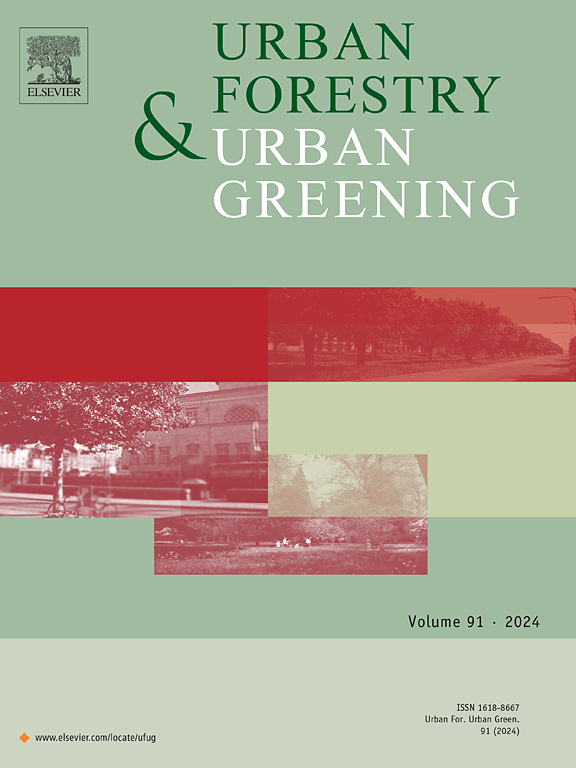中国北京住宅热环境与蓝绿空间可持续性的关系
IF 6
2区 环境科学与生态学
Q1 ENVIRONMENTAL STUDIES
引用次数: 0
摘要
蓝绿空间(BGS)动态对热环境的影响已在城市尺度上得到广泛探讨,但在社区尺度上讨论较少。此外,蓝绿空间的可持续性对热环境的直接影响也不明确。本研究利用 2013 年和 2019 年的高分辨率 BGS 分类和地表温度(LST)地图研究了这种影响。结果表明,2013 年至 2019 年,北京城区的 BGS 覆盖率增加了 4.22%,其中 70.94% 的增加发生在居住区边界和邻近 300 米缓冲区内。居住区边界内的 BGS 持续性为 75.31%,300 米缓冲区内的 BGS 持续性为 71.73%。要有效降低热风险,就必须同时实现 BGS 的净增长和可持续性。300 米缓冲区内的 BGS 制冷效率更高,而其不可持续性则增加了居民的热风险。蓝色和绿色空间的结合有助于形成可持续的 BGS 景观。这些发现为 BGS 对 LST 动态的影响提供了新的证据,并为基于 BGS 的社区热适应提供了新的见解。本文章由计算机程序翻译,如有差异,请以英文原文为准。
Residential heat environment in relation to blue-green space sustainability in Beijing, China
The impacts of blue-green space (BGS) dynamics on the heat environment have been widely explored at the urban scale, but less discussed at the community scale. In addition, the direct effect of BGS sustainability on the heat environment was unclear. This study examined this impact using high-resolution BGS classification and land surface temperature (LST) maps for 2013 and 2019. Results showed that BGS coverage in urban Beijing increased by 4.22 % from 2013 to 2019, with 70.94 % of this increase occurring inside the residential boundary and adjacent 300 m buffer zone. BGS sustainability was 75.31 % inside residential boundary, and 71.73 % in the 300 m buffer zone. Effective heat risk reduction required both net increase and sustainability of BGS. BGS in the 300 m buffer zone was more efficient in cooling and its unsustainability increased the residential heat risk. The combination of blue and green spaces can contribute to a sustainable BGS landscape. These findings provided new evidence for the impact of BGS on LST dynamics and offer new insights into BGS-based community heat adaptation.
求助全文
通过发布文献求助,成功后即可免费获取论文全文。
去求助
来源期刊

Urban Forestry & Urban Greening
FORESTRY-
CiteScore
11.70
自引率
12.50%
发文量
289
审稿时长
70 days
期刊介绍:
Urban Forestry and Urban Greening is a refereed, international journal aimed at presenting high-quality research with urban and peri-urban woody and non-woody vegetation and its use, planning, design, establishment and management as its main topics. Urban Forestry and Urban Greening concentrates on all tree-dominated (as joint together in the urban forest) as well as other green resources in and around urban areas, such as woodlands, public and private urban parks and gardens, urban nature areas, street tree and square plantations, botanical gardens and cemeteries.
The journal welcomes basic and applied research papers, as well as review papers and short communications. Contributions should focus on one or more of the following aspects:
-Form and functions of urban forests and other vegetation, including aspects of urban ecology.
-Policy-making, planning and design related to urban forests and other vegetation.
-Selection and establishment of tree resources and other vegetation for urban environments.
-Management of urban forests and other vegetation.
Original contributions of a high academic standard are invited from a wide range of disciplines and fields, including forestry, biology, horticulture, arboriculture, landscape ecology, pathology, soil science, hydrology, landscape architecture, landscape planning, urban planning and design, economics, sociology, environmental psychology, public health, and education.
 求助内容:
求助内容: 应助结果提醒方式:
应助结果提醒方式:


